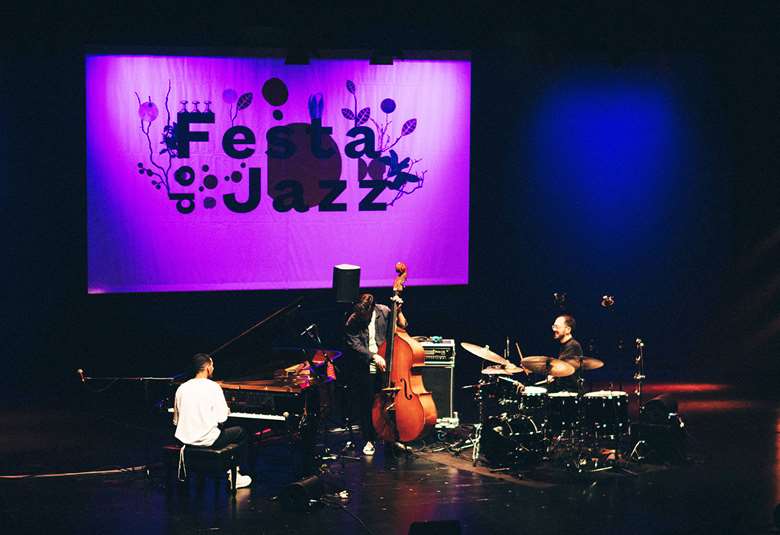Pianist Wajdi Riahi and vibraphonist Duarte Ventura among highlights at Festa Do Jazz Lisbon, Portugal
Kevin Le Gendre
Friday, December 13, 2024
There was a powerful line up at this exciting Portuguese jazz summit which packed in a contrasting range of sounds

Nothing charms an audience more than hearing an international artist speak its language. When Liv Andrea Hauge addressed a full house in fluent Portuguese at Lisbon’s annual Festa do Jazz, a wave of excitement ran through the Centro Cultural De Belem. The Norwegian pianist, whose trio played a competently melodic set that went down well, had spent time in Mozambique, an erstwhile Portugese colony, which indirectly evoked the undeniably complex relationship between the African state and the European former ruler. Just a week before the jazz festival a major exhibition Family Albums: Photographs Of The African Diaspora In Greater Lisbon at the Padraodos Escobrimentos museum also brought a sharp focus on Portugal’s black communities, and the final day of (the two day) Festa saw more people of colour on stage than the first. Singer-bassist Razy and rapper Nitry were notable alongside drummer Fillipe Padrao in Jazzopa, a group purveying hip-hop edged soul that would have been better suited to a club rather than a concert hall but percussionist lúri Oliveira (pictured below) made a real impression in Reperio the nonet led by vibraphonist-composer Duarte Ventura, the highlight of the whole programme.

Sporting shoulder length dreadlocks and surrounded by a gaggle of congas and various other ‘hand drums’, bells and whistles Oliveira brought notable detail as well as dynamic rhythmic support to music that was intricately threaded around the leader’s glistening chords and Marta Rodrigues and Joana Raquel’s arrow-like wordless vocal. If they provided the conceptual core of the music, which often had a decidedly ethereal almost misty quality such was the precision and delicacy of the execution, then the rhythm section – double bassist Ze Almeida, pianist Miguel Meirinhos and the aforementioned Oliveira - also drove the songs through darting, metrically fluid arrangements that had echoes of the eye of the needle funkiness that defined the M-Base school of the late ‘80s and early ‘90s. Alto saxophonist Miguel Valente played with a gritty aggression that enhanced the grooves, and the advantage of a nine piece unit was its bend of small group tightness and big band power, which was encapsulated in a thrilling moment when the ensemble broke right down to a duet between bassist Almedia and cellist Adele Viret, in which lines converged and diverged to good effect. Bandleader Ventura is a strong soloist in the busy four mallet vein as well as a skilled writer, and when the band captures a performance like this in the studio it could well emerge as a flagship for Portugese jazz. Having said that Sonic Tender was an intriguing emblem of the country’s talent pool. Drummer Joao Valinho, guitarist Joao Carreiro and pianist Guilherme Aguiar make music that is boldly circular if not static, hinged on ambiance rather than harmonic movement.
At times they underwhelmed but their closing track was a brilliant creation of sustained tension and minimal variation on two chords that landed somewhere while going nowhere. The other young Portugese who impressed was pianist Joana Sa, whose collaboration with Greek vocalist Savina Yannatou stood in a long lineage of exploratory sound painting in which the former’s highly inventive string manipulation and use of temple bowls and the latter’s blend of earthy, primal utterances and swish operatic finesse held the audience rapt. If that duo made the point that the festival had a notable gender balance then the presence of Franco-Syrian singer Climene Zarkan took things to another level. The front woman of Sarab has compelling charisma as well as a powerful voice and the band’s often politically charged songs had a thrashy punky energy and Arabic resonances enhanced by potent solos from keyboardist Thibault Gomez, guitarist Baptiste Ferrandis and trombonist Robinson Khoury.
The other group with a marked non-western resonance was the trio led by Belgian pianist-vocalist Wajdi Riahi, whose composing and improvising both reflect his immersion in jazz history and Tunisian heritage. The stambeli trance rhythms with which he, double bassist Basile Rahola and drummer Pierre Hurty closed the set were outstanding and so too was a solo piano piece in which Riahi whistled the melody to produce an enchanting effect that was almost like a harmonica-cum-synthesizer echoing in a warm valley. A standing ovation and brisk business at the merch table made it clear that there is an appetite for music with a wide cultural span, and it would be interesting to see if the African (and Asian) Diaspora in Portugal will become more prominent on the country’s jazz scene in the coming years amid the apt debate, as is the case in the UK and elsewhere in Europe, on post-imperial politics.
At the Maat museum, just a short walk from the festival, there was a quite stunning exhibition that featured among others, Angolan artist Kiluanji Kia Henda and Afro-Brazilians Gabriel Massan and Jota Mombaca It was called Black Ancient Futures.


